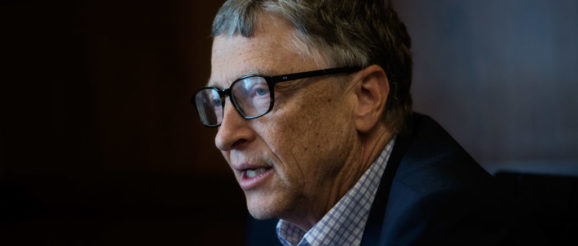Bill Gates says time, innovation needed before coronavirus lockdowns end

Billionaire philanthropist Bill Gates on Thursday warned that the world’s emergence from coronavirus lockdowns will be slow, and cautioned that it will take innovation before people feel safe enough to attend large public events or flock to restaurants.
“Even as a government relaxes restrictions on behavior, not everyone will immediately resume the activities that are allowed,” Gates, the co-founder of Microsoft and co-chair of the Bill and Melinda Gates Foundation, wrote in a long essay expected to be posted later Thursday to his blog. “It will take a lot of good communication so that people understand what the risks are and feel comfortable going back to work or school.”
Gates said that the dramatic shutdowns of cities and countries worldwide have been necessary to slow spread of the SARS-CoV-2 virus, which causes Covid-19, despite the enormous societal costs.
“It is reasonable for people to ask whether the behavior change was necessary. Overwhelmingly, the answer is yes,” he wrote. “The change allowed us to avoid many millions of deaths and extreme overload of the hospitals, which would also have increased deaths from other causes.”
To those who argue the cure is worse than the disease — that the global economy has been crippled because of the shutdowns imposed to slow spread of the virus — Gates noted that even without strong government actions, people would have changed their behaviors in the face of rapid global spread of the dangerous virus.
“There was never a choice to have the strong economy of 2019 in 2020,” he said.
Gates suggested a highly effective treatment — one that might be effective in about 95% of cases — would likely be needed for people to feel confident that they could resume activities like going to large sporting events or concerts. He noted options for treatments include those that harvest antibodies from the blood of survivors to help people combat the disease.
Vaccines would be the most obvious path back to normalcy, he said, but they and other needed interventions will require enormous investments if they are to be developed quickly.
“I think of this as the billions we need to spend so we can save trillions,” he said.
Gates warned that vaccines are not likely to be distributed equitably in the early days.
“Ideally, there would be global agreement about who should get the vaccine first, but given how many competing interests there are, this is unlikely to happen,” he wrote. “The governments that provide the funding, the countries where the trials are run, and the places where the pandemic is the worst will all make a case that they should get priority.”
He also warned it could be difficult to test the effectiveness of vaccines, given the fast-moving nature of the outbreak. They will need to be tested in areas where there is enough current spread to see if they actually are protective.
